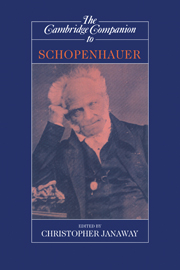Book contents
- Frontmatter
- Introduction
- 1 Schopenhauer on the Self
- 2 Schopenhauer and Knowledge
- 3 The Fourfold Root
- 4 Schopenhauer, Kant, and the Methods of Philosophy
- 5 Will and Nature
- 6 The Influences of Eastern Thought on Schopenhauer’s Doctrine of the Thing-in-Itself
- 7 Ideas and Imagination
- 8 Schopenhauer’s Narrower Sense of Morality
- 9 Schopenhauer on Death
- 10 Schopenhauer’s Pessimism
- 11 Nietzsche, Schopenhauer, and Dionysus
- 12 Schopenhauer, Will, and the Unconscious
- 13 Schopenhauer and Wittgenstein
- Bibliography
- Index
10 - Schopenhauer’s Pessimism
Published online by Cambridge University Press: 28 May 2006
- Frontmatter
- Introduction
- 1 Schopenhauer on the Self
- 2 Schopenhauer and Knowledge
- 3 The Fourfold Root
- 4 Schopenhauer, Kant, and the Methods of Philosophy
- 5 Will and Nature
- 6 The Influences of Eastern Thought on Schopenhauer’s Doctrine of the Thing-in-Itself
- 7 Ideas and Imagination
- 8 Schopenhauer’s Narrower Sense of Morality
- 9 Schopenhauer on Death
- 10 Schopenhauer’s Pessimism
- 11 Nietzsche, Schopenhauer, and Dionysus
- 12 Schopenhauer, Will, and the Unconscious
- 13 Schopenhauer and Wittgenstein
- Bibliography
- Index
Summary
SCHOPENHAUER’S QUESTION
In Book Five of The Gay Science Nietzsche writes that 'unconditional and honest atheism' is 'the locus of Schopenhauer's whole integrity' and 'the presupposition of the way he poses his problem'. If we reject the 'meaning' Christianity assigns to the world, then, writes Nietzsche, 'Schopenhauer's question immediately comes to us in a terrifying way: Has existence any meaning at all?' (Gay Science §357). It is true that, for Schopenhauer, everything in ordinary life is characterized by Nichtigkeit, or nothingness, which might suggest the thought that life is meaningless. (Payne translates the term as 'vanity', which loses much of its power.) But Schopenhauer tends to speak more often in the vocabulary of value, asking whether life is a business which covers its costs, whether the world is bankrupt, whether this world is the best, or the worst, possible. Thus, with regard to pessimism, I shall take Schopenhauer's prime question to be: What value does existence have? and more particularly: What is the value of my being what I am? For Schopenhauer, as Nietzsche implies, certain answers that were once thinkable on the assumption of Christian dogma - that each of us is an immaterial substance or a pure, rational soul or part of some supernatural design - are not available.
- Type
- Chapter
- Information
- The Cambridge Companion to Schopenhauer , pp. 318 - 343Publisher: Cambridge University PressPrint publication year: 1999
- 23
- Cited by



